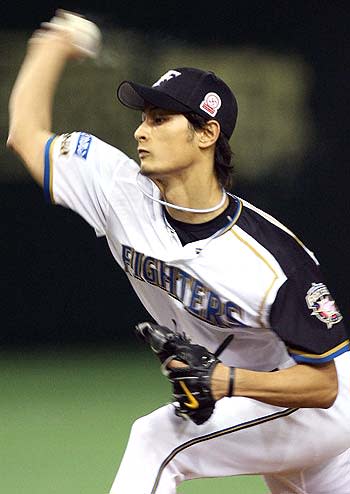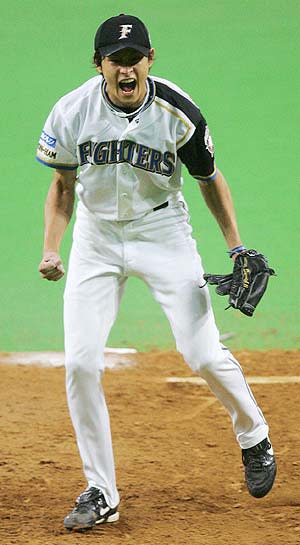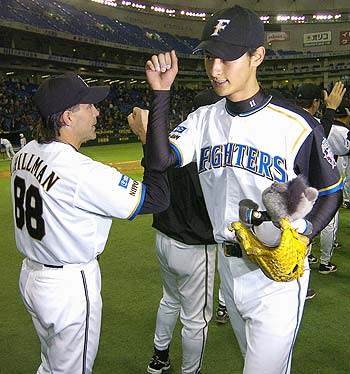Iconic ace Darvish pushes Japan's boundaries
SAPPORO, Japan – Following a victory last season, Yu Darvish, the winning pitcher for the Hokkaido Nippon Ham Fighters, stood in front of a microphone inside a packed stadium, thanked his teammates and fans for their support, and announced that he had knocked up an actress who he met three months earlier and would marry her to preserve his family's name.
The hero interview, as it's called, is standard postgame fare in Japanese baseball, made-for-TV junk food. Darvish had found a way to reinvent it. He does that with everything.
Newspapers across the country trumpeted the news with blown-up photos of Darvish. Even the trashiest rags sell when they splash him across their covers. Three years ago, one of them turned Darvish into Japan's most infamous teenager because of a cigarette. And now, at 21, he has been dubbed by all of them as the face of Japanese baseball.
So it comes as no surprise when the P.A. announcer summons Darvish for the hero interview on opening day last week. The right-hander has thrown a four-hit shutout, struck out 10 and stymied the Chiba Lotte Marines. Music plays in the background. It sounds like an elevator version of "The Natural" theme. The Fighters Girls, Nippon Ham's cheerleaders, all with preternaturally high cheekbones, stand as instructed, chests out and red pom-poms tucked behind their backs. Two women in the front row of Sapporo Dome wearing pink wigs wave at Darvish. Others scream. More blush.
"Fonzie and Elvis," says Trey Hillman, his former manager. "That's Darvish."
He stands 6-foot-5, is model skinny and resembles no one else in the stadium, the product of an Iranian father and Japanese mother. He's undeniably good looking, and he knows it, having peeled off his clothes for a nude magazine spread last year.
In a country with a black-and-white attitude, Darvish is the color, the entertainment, the rebel, the wild side, the kind of character Major League Baseball loves, and people here nonetheless revere him for it. He wears his cap with a slight tilt to the left and his smile the same, the establishment his to mock. While boldness is generally frowned upon, Darvish is an exception, almost beyond reproach, in spite of his demeanor, his background and his follies.
He gets away with it because he throws shutouts on opening day, and then despite all that the Japanese teach about humility, Yu Darvish, who prefers honesty, stands up in front of the crowd and says: "That was exactly what I expected."
The boy was born with the wrong blood.
Farsad Darvish and his wife, Ikuyo, moved to Japan in 1982, and he knew that when they had a child it would be different. Japan prides itself on homogeneity, a significant majority of its 128 million people with 100 percent Japanese heritage. There are the Yamato people, the indigenous ethnic majority, and there is everyone else, like Yu Darvish.
His parents met at Eckerd College, a liberal-arts school in St. Petersburg, Fla., where Farsad played soccer. Farsad's father was a travel agent in Iran, and his dad sent him to the United States in 1977 to attend high school in Berkshire, Mass., and race competitively in motocross.
"I was fascinated by the individuality," Farsad says. "Lots of freedom. Independence."
In 1986, Farsad started working for the Jaycees and Ikuyo had Yu. Farsad tried to teach him soccer. Two left feet. And Yu didn't gravitate toward motocross, either, having seen his father bite it on too many mountainsides.
Farsad watched enough baseball to understand talent, and as his son grew taller, the other kids stopped hitting his fastballs. By the time he entered high school, Darvish's reputation had spread beyond his hometown of Habikino, in Osaka Prefecture. When scouts started following Darvish, Farsad realized his lessons needed to shift from baseball to everything that would accompany life for the son of a Muslim in a country with so few.
"He had his own questions of character and personality," he says. "And we used those to make him stronger. You can be a pure Japanese and look at someone who isn't just the same. You can't control people. You can only control yourself.

Yu Darvish pitches for the Hokkaido Nippon Ham Fighters.
(TOSHIFUMI KITAMURA/AFP/Getty Images)
"We went past nationality and color, and looked inside."
And accordingly, it's a rather simple issue for Darvish.
"I was born and raised in Japan, so I believe myself 100 percent Japanese," he says. "My dad is Iranian, but he's got a lot of Japanese tastes, personality. I was surrounded by Japanese people, so I totally think I'm Japanese."
Throughout the 1960s and '70s, Sadaharu Oh and Shigeo Nagashima, teammates with the Yomiuri Giants, were the best players in Japan. They were like Babe Ruth and Lou Gehrig, Oh the all-time home run champion and best player in Japanese history and Nagashima his brilliant counterpart.
Only Nagashima's popularity dwarfed Oh's, largely because he was pure Japanese and Oh had a Chinese father.
"Sometimes, you're just not a member of the club," says Bobby Valentine, the former Rangers and Mets manager who is in his sixth season with the Chiba Lotte Marines. "Darvish can never be a full-fledged, card-carrying member. If Sadaharu Oh has never been completely accepted, who could be?"
When he was 18, Darvish was caught smoking a cigarette inside a pachinko gambling hall by a gossip magazine photographer. Less than a week later, two anti-smoking doctors announced they would commission a study on the smoking habits of players from all 12 teams in Nippon Professional Baseball, because, they said, "some may be addicted and need to receive medical treatment."
Major League Baseball has steroids. Japan has cigarettes.
Darvish inspires hysteria, and never was it more evident than during the tobacco scandal of 2005. It was February, a week before his high school graduation, and he was at his first spring training with the Fighters. In the previous six months, Darvish had thrown a no-hitter at the prestigious Koshien high school tournament and gone No. 1 in the draft to Nippon Ham. The last pitcher to jump from high school to Japan's major leagues with such expectations was Daisuke Matsuzaka.
It is illegal to smoke until age 20, according to the government of Japan, which, by the way, owns a majority of Japan Tobacco. First the Fighters banished Darvish from their spring training facility in Okinawa to the minor league dorm in Chiba for "re-education." Then Tohoku High School followed by suspending him for five days, causing him to miss the graduation ceremony.
When Darvish arrived at Haneda Airport, more than 200 reporters awaited him. He bowed and apologized, bowed and said he would not smoke another cigarette in his life, bowed and promised to do right by Nippon Ham, the pork company that owns the Fighters.
"I've never seen anything in the United States that's an equivalent to what that young man went through at 18," Hillman says.
Actually, it happens every day in Los Angeles, the paparazzi chasing starlets and chronicling their foibles. Darvish was their Japanese equivalent, only he spent his days writing in "reflection journals" to convince his school and the Fighters that he recognized the error of his ways.
"He was always thinking he could do anything," Farsad says. "He learned what came with it. He made trouble, he took responsibility. And I saw growth."
The school lifted its suspension and mailed Darvish his diploma. The Fighters reinstated Darvish and sent him back to the training site for several months of conditioning. He debuted June 16 and began the game by pitching eight scoreless innings.

Yu Darvish: "I don’t get nervous on the mound. I lock on what I’m doing."
(AP Photo/Kyodo)
The Sapporo Dome is a beast of post-industrial architecture, concrete and marble intermingling, and it sits atop a hill that overlooks the city of nearly 2 million on the northern island of Hokkaido. Sapporo's downtown is filled with noodle shops and casinos, its outskirts with boxy residential homes and, on this day, its air with anticipation, because the Fighters are back and Darvish is on the mound.
Three hours before the 2 p.m. first pitch, lines stretch from one end of the dome to the other. Women outnumber men, and they need their Darvish fix. From the advertisers to the fans, the media to the Nippon Ham executives, the rich who want to mingle with him and the poor who want help from him, everyone needs a piece. Darvish is an industry, selling watches and coffee and milk and train tickets and, yes, ham, and on this afternoon, he is the ticket holders' to ogle.
"When I walk down the street and people ask for autographs and shake my hand, I try to be friendly," Darvish says. "But I don't get affected by the crowds and different settings. I try to be myself.
"I know I get a lot of attention. But I handle it in the right way. I don't get nervous on the mound. I lock on what I'm doing."
In right field, a pocket of Lotte fans wave flags and beat drums and blow horns and whistle and carouse and hoot and holler and chant. Darvish strikes out the leadoff batter on three pitches. The cheers strengthen anyway. Darvish strikes out Julio Zuleta, who hit an opening day grand slam against him last season, to end the second inning. The Marines' leadoff hitter, Tsuyoshi Nishioka, swings so hard through a 94-mph fastball in the third inning that he loses his balance.
When Darvish strikes out Zuleta a second time, he steps off the mound, dissatisfied with his pitch, and pantomimes his motion once more to ensure it's just to get it right. Darvish on the mound is a tangle of emotion: frustration and fist-pumping and sulking and screaming, almost cartoonish, when he works his way out of a bases-loaded jam in the sixth inning.
Before Darvish cinches the shutout, the first on opening day with double-digit strikeouts in Japanese history, dozens of reporters gather around TVs behind home plate and track his every movement. Mound to bench to podium to picture posing with the Fighters' mascot, a white-mohawked bear, and finally on a jog to left field, where he savors the cheers, throws the game ball into the stands and struts back to the dugout.
During the postgame news conference, Darvish doesn't comport himself with quite the same confidence. He looks a little like a '60s throwback, his long hair spraying out from underneath his cap, his posture a bit lax, like he'd rather be anywhere else. He engages verbally but keeps his head down or stares off into space, sometimes to a man in the corner.
That person is Sean Ito, and he's Darvish's agent. He wears a black leather coat and a belt buckle fit for a cowboy. His hair is slicked back, his left ear pierced with a diamond stud and his right occupied by a gold Razr. He and his partner, Daisuke Ogi, control Darvish's public image, and it's beginning to occur to them that the better Darvish pitches – last year he won the Sawamura Award, the Japanese equivalent to the Cy Young – the tougher their jobs will get.
The next day, Darvish gives his first interview with an American media outlet. It takes place in Sapporo Dome's Doping Control Room, a white-walled space adjacent to the Fighters' clubhouse with 13 brown seats, two garbage cans, a phone, a small TV and an ashtray, for those who just crave that post-urine-test smoke. Actually, it looks more like a storage room, with extra bags and boxes piled along one wall.
He knocks on the door and enters with Ito and Ken Iwamoto, the translator for Hillman during his five seasons as manager of the Fighters. Darvish eases into his seat and talks about growing up and the pressures of today and the titanium necklace and wristband he wears for good luck and first-time fatherhood.
The conversation turns to his future and Major League Baseball's place in it. Any general manager with a pulse covets Darvish. Last season, most of which he pitched as a 20-year old, he went 15-5 with a 1.82 earned-run average and 12 complete games. His fastball hits 97 mph, his slider 91, and he throws a curveball, changeup and sinker. With Darvish, it's a matter of when he asks the Fighters to post him for auction to the highest major-league bidder.

"Fonzie and Elvis," says Trey Hillman, Yu Darvis' former manager. "That’s Darvish."
(AP Photo/Kyodo)
So, when?
"That," Iwamoto says, "is a question he can't answer."
Tak Kojima sits alone on a bench in the Fighters' dugout watching practice the day after the opener. For more than 30 years, he helped run the Fighters as president, de facto general manager and acting owner. Kojima forged the team's partnership with the New York Yankees in the '70s, led the Fighters through Nippon Ham's beef-labeling scandal earlier this decade and oversaw their first Japan Series championship in 2006. He's retiring in March, so he can be honest about the Fighters' paranoia with Darvish.
"We're concerned about losing him," Kojima says. "For him, there's plenty of time until free agency. I hope he chooses Japanese baseball."
Japanese baseball's relevancy has teetered in recent years, and insiders fear that Darvish posting long before his ninth season – after which Japanese players become free agents – might encourage others to do the same.
Certainly there are benefits for Nippon Ham. One American League executive guessed if Darvish posted after this season the fee to negotiate a deal would cost "around $75 million." Another suggested "it could be even higher." If the Red Sox paid $51 million for a 26-year-old Matsuzaka, a 22-year-old Darvish could command a 50 percent premium.
"Right now," Valentine says, "his stuff is probably sharper than Daisuke's."
The praise only begins there. Terrmel Sledge, the former Padres outfielder who joined the Fighters this offseason, calls Darvish "one of the five best I've ever seen." Hillman believes Darvish would step in as the No. 1 starter on a majority of major league teams. Kojima thinks Darvish might be the best pitcher in Japanese history.
"He's so good," Farsad says. "I've watched this game for a long time. I see a lot of talented players. And I told him that you don't go to Major League Baseball because it's the greatest league. You go there because the best players are there.
"He feels he has to prove himself in Japan. I'm not rushing into anything. He's not."
During the offseason, Darvish headed to Okinawa for his workouts with an improved diet to help build muscle. He needs his strength for the next year. In August, he will pitch for Japan in the Olympics, and in October, he hopes, in the Japan Series. Then in March 2009 comes the World Baseball Classic, where Matsuzaka introduced himself to the American public by winning the finale and becoming the tournament MVP in 2006.
Darvish has pledged to pitch for Japan, and considering what his father says – "Once he has accomplished something, he gets bored and doesn't learn much," Farsad says, "and eventually he needs to change the competition" – he could follow Matsuzaka's path to the major leagues as well.
Which brings us back to Darvish's future. Even when asked about it in general terms, Darvish is evasive.
"I don't draw a big picture," he says. "I'm locked on to be a part of this team and contribute to the winning here. My focus is this club. And then after that, I'll think about the future."
So for now, Darvish wears his fancy clothes and keeps his hair coiffed and sells his products. He runs the Yu Darvish Water Fund to provide clean drinking water around the world. He married Saeko, the actress, in November. And the hero interview is almost always his.
"I'd like to keep him in Japan," Kojima says. "But all the world is waiting for him."
Just then, Darvish walks off the field and past the dugout. Photographers trail him. Before entering the tunnel, the boy with the wrong blood in his veins, the memory of a cigarette dangling from his lips, turns and poses for the clicking cameras. The face of Japanese baseball has never looked so real.
